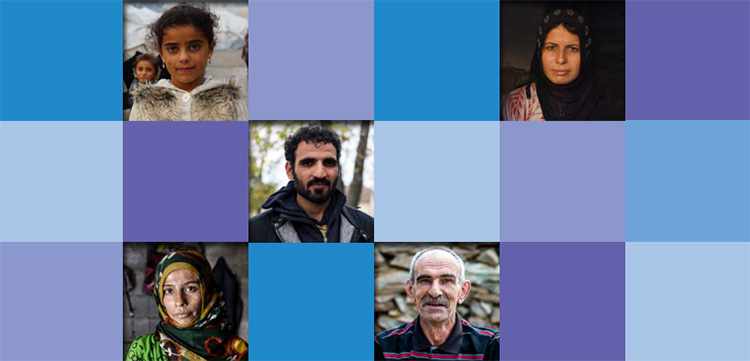
The report “Build back fairer: achieving health equity in the Eastern Mediterranean Region” provides ground breaking insights into the state of health inequities in the Region and urges countries to take action to address the social determinants of health to reverse the worsening trend of inequity – aggravated by the COVID-19 pandemic, ongoing conflict, mass movements of people, environmental challenges, gender inequities and unemployment.
Although WHO’s Eastern Mediterranean Region has had a relatively low number of deaths from COVID-19 as compared to other regions, containment policies are set to have a long-term impact on health, and in particular on those who are already among the poorest and most vulnerable groups.
“There is no biological reason for the startling differences in life chances for people in our Region. Inequalities in health are evident from the beginning of life: under-5 mortality ranges from 7 to 128 per 1000 live births, life expectancy ranges from 54 to 79 among men, and from 57 to 80 among women. Inequities in power, money and resources prevail. These are what we call the social determinants of health, and we need to address these to improve people’s health,” said Dr Ahmed Al-Mandhari, WHO’s Regional Director for the Eastern Mediterranean. “As this report shows, the impact of COVID-19 will increase inequalities unless immediate mitigation and adaptation measures based on equity are introduced,” he said.
The report, prepared by global and regional experts led by the Chair of the Commission on Social Determinants of Health and leading global voice on health equity Professor Sir Michael Marmot, was presented to stakeholders on 31 March 2021 in Cairo. Development of the report was supported by the Alliance for Health Policy and Systems Research and Institute of Health Equity at University College London.
Executive summary: Report of the Commission on Social Determinants of Health in the Eastern Mediterranean Region

The report “Build back fairer: achieving health equity in the Eastern Mediterranean Region” provides ground breaking insights into the state of health inequities in the Region and urges countries to take action to address the social determinants of health to reverse the worsening trend of inequity – aggravated by the COVID-19 pandemic, ongoing conflict, mass movements of people, environmental challenges, gender inequities and unemployment.
Although WHO’s Eastern Mediterranean Region has had a relatively low number of deaths from COVID-19 as compared to other regions, containment policies are set to have a long-term impact on health, and in particular on those who are already among the poorest and most vulnerable groups.
“There is no biological reason for the startling differences in life chances for people in our Region. Inequalities in health are evident from the beginning of life: under-5 mortality ranges from 7 to 128 per 1000 live births, life expectancy ranges from 54 to 79 among men, and from 57 to 80 among women. Inequities in power, money and resources prevail. These are what we call the social determinants of health, and we need to address these to improve people’s health,” said Dr Ahmed Al-Mandhari, WHO’s Regional Director for the Eastern Mediterranean. “As this report shows, the impact of COVID-19 will increase inequalities unless immediate mitigation and adaptation measures based on equity are introduced,” he said.
The report, prepared by global and regional experts led by the Chair of the Commission on Social Determinants of Health and leading global voice on health equity Professor Sir Michael Marmot, was presented to stakeholders on 31 March 2021 in Cairo. Development of the report was supported by the Alliance for Health Policy and Systems Research and Institute of Health Equity at University College London.
Executive summary: Report of the Commission on Social Determinants of Health in the Eastern Mediterranean Region










